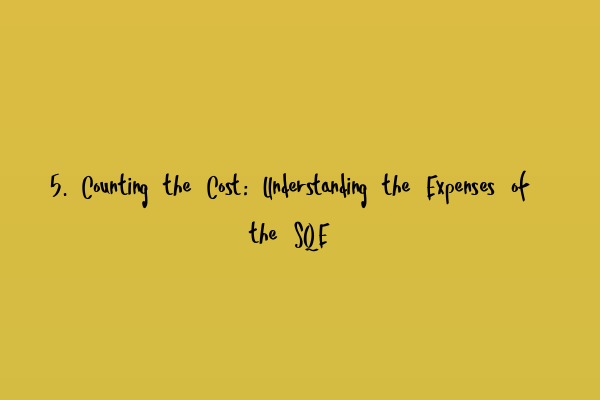Counting the Cost: Understanding the Expenses of the SQE
As the Solicitors Qualifying Examination (SQE) becomes the new route to qualification for solicitors in England and Wales, aspiring lawyers need to be aware of the various expenses associated with the examination. Understanding these costs will allow candidates to plan their budget effectively and make informed decisions as they progress through the SQE journey.
In this article, we will break down the expenses of the SQE, from preparation courses to examination fees, and provide insights on how to minimize costs without compromising on the quality of your preparation.
1. Preparation Courses
The first step in preparing for the SQE is enrolling in a reliable preparation course. These courses provide comprehensive study materials, guidance, and support to help candidates pass the examination. However, it’s essential to choose a course that fits your budget without compromising on its effectiveness.
SQE 1 Preparation Courses are designed to equip candidates with the necessary knowledge and skills to tackle the multiple-choice questions (MCQs) in this stage of the examination. These courses often include access to online resources, practice quizzes, and mock exams to assess your progress and identify areas for improvement. Click here to access SQE 1 Practice Exam Questions.
For SQE 2, which focuses on practical legal skills, SQE 2 Preparation Courses offer invaluable guidance in areas such as advocacy, interviewing, drafting, and legal research. These courses are crucial to developing the practical skills required to succeed in the SQE 2 assessments.
2. Examination Fees
The SQE examination fees are another significant expense to consider. The examination is split into two stages, with separate fees for each stage. The exact cost of the SQE may vary depending on the examination center and other factors, so it’s essential to check the SRA’s official website for the most up-to-date information.
Candidates are required to pay the examination fee when registering for each stage. The fee covers the assessment, marking, and administration costs. It’s important to budget for these fees ahead of time to avoid any last-minute financial stress.
3. Travel and Accommodation
If you need to travel to an examination center away from your place of residence, it’s crucial to factor in travel and accommodation costs. These expenses can vary significantly depending on the location and duration of your stay.
To save on travel expenses, consider booking your travel well in advance to take advantage of cheaper fares. Additionally, explore options such as sharing accommodation with fellow candidates or staying in affordable hotels or hostels to minimize costs. Planning ahead and being flexible with your travel arrangements can help reduce the overall financial burden.
4. Additional Study Materials
While comprehensive preparation courses provide most of the necessary study materials, some candidates may find it helpful to invest in additional resources. These can include textbooks, supplementary guides, or online resources that offer further practice questions or explanations.
When considering additional study materials, be mindful of their relevance and the potential overlap with the materials provided by your chosen preparation course. Do your research and consult with experienced candidates or professionals to ensure that any supplementary materials you invest in are worth the expense.
5. Resits and Retakes
It’s important to acknowledge that you may not pass the SQE on your first attempt. To be prepared for this possibility, it’s essential to consider the potential cost of resits or retakes. These additional examination attempts will incur extra fees, so it’s crucial to budget for these contingencies.
While it’s ideal to pass the SQE on the first attempt, having a financial plan in place for resits or retakes will provide you with peace of mind. Use any unsuccessful attempts as an opportunity to reassess your preparation strategy and consider seeking additional support or guidance to improve your chances of success.
In conclusion, understanding the expenses associated with the SQE is crucial for effective planning and budgeting. By investing in suitable preparation courses, being aware of examination fees, considering travel and accommodation costs, evaluating the need for additional study materials, and preparing for resits or retakes, candidates can navigate the financial aspects of the SQE with confidence.
Remember, while passing the SQE is undoubtedly a significant achievement, it’s equally important to strike a balance between financial prudence and ensuring you receive the necessary support and resources to succeed. Good luck on your SQE journey!
